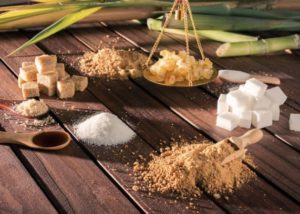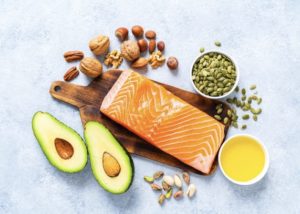- Home
- /
- Vitamins etc.
- /
- Other substances
- /
- Collagen: Types, Functions, Benefits
- /
- Multifaceted Collagen: Types, Functions,...
- 1. What Is Collagen?
- 2. Skin Health and Beauty
- 3. Joint and Bone Well-being
- 4. Muscle Mass and Intensity
- 5. Gut Health and Digestion
- 6. Hair and Nail Health
- 7. Collagen Additives: The Collagen Craze
- 8. Choosing the Right Collagen Supplement
- 9. Collagen Dosage and Timing
- 10. Potential Side Effects and Allergies
- 11. The Scientific Evidence
- 12. Beyond Supplements: Natural Sources of Collagen
- 13. Lifestyle Factors: Beyond Supplements and Diet
- 14. Is Collagen Worth It?
Collagen, often referred to as the “glue” that keeps the body together, is a fascinating and essential protein that is crucial in supporting our health and vitality. This remarkable protein has acquired vast popularity recently, with a surge in collagen supplements, creams, and treatments promising a myriad of benefits.
From its role in enhancing skin’s youthful glow to supporting joint mobility and muscle strength, collagen has captivated the wellness landscape with its multifaceted benefits. But beneath the surface of this wellness superstar lies a rich tapestry of science, considerations, and lifestyle choices that form the essence of holistic health.
Welcome to our comprehensive journey into the world of collagen. This holistic guide aims to peel back the layers of collagen’s potential, from its diverse types and functions to its application in various aspects of health and beauty. We will explore the science, the hype, and the nuanced considerations that underscore the collagen craze. Through each chapter, we will weave together a tapestry of knowledge that empowers you to make informed choices on your path to wellness.
So, whether you’re seeking radiant skin, joint comfort, muscle strength, gut health, or general vitality, join us as we embark on a holistic exploration of collagen’s potential and its role in a life well-lived. Together, we’ll unlock the secrets, dispel the myths, and embrace the possibilities that collagen brings to the table in the pursuit of holistic health and wellness.
1. What Is Collagen?
Collagen is a textural protein discovered profusely in the human body, accounting for around one-third of the body’s summary protein content. It is a fibrous, connective tissue protein that provides strength, prop and elasticity to diverse tissues, including skin, bones, muscles, tendons, and ligaments.
Types of Collagen
Collagen isn’t a one-size-fits-all protein; instead, there are several types, each with unique characteristics and functions. The primary types of collagen involve:
I – The famous type, detected in skin, bones, tendons, and organs. It provides tensile strength and structure.
II – Predominantly present in cartilage, it is crucial for joint health and versatility.
III – Frequently discovered nearby Type I collagen, it is significant in skin resilence and the structure of hollow organs like blood vessels.
IV – Creates the foundation of base membranes in divers tissues, inclusive the skin and kidneys.
V – Works in conjunction with Type I collagen, aiding in the formation of cell surfaces and hair.
X – first and foremost detected in cartilage, it matters in endochondral ossification, the process of bone formation.
Understanding these various types of collagen is essential, as they have distinct functions and distribution in the body.
2. Skin Health and Beauty
Few topics have captured the public’s imagination quite like the promise of radiant, youthful skin. In our quest to defy the hands of time and maintain a complexion that exudes vitality, collagen plays a starring role. Let’s delve into the enchantin gworld of collagen’s influence on skin health and beauty.
One of the most talked-about advantages of collagen is its role in skin health and beauty. Collagen fibers in the dermis provide structure and elasticity to the skin. As we age, collagen creating decreases, bringing to wrinkles, sagging, and fine lines. We’ll explore the science after collagen’s impact on skin aging and whether collagen supplementation can help turn back the clock.
2.1. The Architect of Youthful Skin
Collagen is the structural backbone of your skin. Imagine it as the scaffolding supporting the outer layer, the epidermis, and the middle layer, the dermis. This protein provides the framework amenable for the durability, pliability, and ductility that characterize youthful skin. In essence, collagen is the unsung architect of beauty.
2.2. Aging and Collagen: The Unraveling Connection
As we age, a cruel irony unfolds. While we accumulate wisdom and life experiences, our bodies gradually lose the capacity to create collagen at the same rate. Starting in our mid-20s, the collagen factory experiences a slowdown, driving to discernible of aging like wrinkles, fine lines, and sagging skin. Factors like sun exposure, smoking, and unapporpiate dietary choices can exacerbate this process.
How to age healthy read in the article: Geroprotectors: The Secrets to Healthy Aging
2.3. Collagen Supplements: The Fountain of Youth?
The allure of collagen supplements lies in their potential to replenish what time has taken away. By ingesting collagen in various forms, enthusiasts hope to induce collagen creation in the skin and turn back the clock. Scientific studies have indeed shown promise in this area.
2.4. Research offers what collagen addendum may
– Enhance skin resiliency: Collagen additives may drive to increased skin elasticity, giving your skin a firmer and more youthful appearance.
– Hydrate the skin: Collagen has the ability to retain moisture, which can help combat dryness and promote a healthy complexion.
– Reduce wrinkles: Some studies indicate that collagen additives may reduce the depth and number of wrinkles, particularly in the eye area.
– Promote wound treating: Collagen’s role in tissue repair may aid in the healing of skin wounds, including acne scars.
2.5. The Path to Radiant Skin: More than Collagen
While collagen additives suggest exciting possibilities, they are not a magic elixir for perfect skin. Achieving and maintaining skin health and beauty is a multifaceted journey. Here are some tips to complement your collagen regimen:
A. Sun Protection: Shield your skin from deleterious UV rays with sunscreen and protective clothing. Sun damage accelerates collagen breakdown.
B. Healthy Diet: Consume a diet rich in antioxidants, vitamins, and minerals. These nutrients ensorse collagen creation and overall skin health.
About first principle of healthy eating read in the article: The Healthy Meal: A Nutrient-Packed Delight for Health Enthusiasts
C. Hydration: Drink plenty of water to keep your skin hydrated from the inside out. Hydration is key to maintaining skin elasticity.
D. Skincare Trivial Round: Evolve a skincare groove tailored to your skin type and concerns. Cleansing, moisturizing, and using products with collagen-boosting ingredients can be beneficial.
E. Lifestyle Choices: Avoid smoking and undue alcohol consuming, as they can damage collagen and harm skin health.
Check yourself the List here: Healthy Lifestyle: Check Yourself the List
In the quest for radiant skin, collagen is indeed a star player, but it works best in concert with a holistic approach to skincare and overall well-being. Embrace the wisdom of composing collagen additives with appropriate lifestyle choices, and you may find yourself on a path to not only looking but also feeling your best.
3. Joint and Bone Well-being
Type II collagen, prevalent in cartilage, is vital for joint health. It acts as a cushion between bones, preventing friction and ensuring smooth joint movement. We’ll discuss the connection between collagen and states like osteoarthritis and explore the evidence for collagen supplements as a potential remedy.
As we move through life, our ability to stay active and maintain our mobility becomes increasingly valuable. This is where collagen, specifically Type II collagen, steps into the limelight, playing a pivotal role in the health and longevity of our joints and bones.
3.1. Connection of Joints
Joints are the body’s intricate hinges, facilitating movements as simple as bending a finger or as complex as executing a perfect pirouette. The smooth functioning of these joints hinges on the presence of collagen, in particular Type II collagen, which is abundant in cartilage – the cushioning tissue that prevents bones from grinding against each other.
3.2. Cartilage and Cushioning
Imagine your joints as well-oiled machines. Cartilage, the connective tissue enriched with Type II collagen, acts as the oil that keeps these machines running smoothly. This resilient tissue cushions the ends of bones and allows for frictionless movement, whether you’re jogging, dancing, or simply reaching for a book on a high shelf.
3.3. The Aging Dilemma
Unfortunately, time has a way of challenging our bodies, and our joints are no exception. As the years roll on, the production of collagen – that significant building block of cartilage – begins to taper off. This decline can lead to a host of joint-related issues, including osteoarthritis, a degenerative condition that affects millions worldwide.
About healthy aging read in the article: 8 Secrets of Longevity and Well-being from Blue Zones residents
3.4. Collagen Supplements and Joint Health
In response to the inevitable aging process and the prevalence of joint issues, collagen additives have grown a sought-after remedy. Here’s how they may facilitate to joint health:
– Supporting Cartilage: Collagen additives may stimulate the production of collagen in cartilage, aiding in its repair and maintenance.
– Decreasing Joint Pain: Some researches offer that collagen additives can alleviate joint pain and rigidity, making movement more comfortable.
– Enhancing Joint Function: Enhanced cartilage health can lead to improved joint function and flexibility, allowing individuals to maintain an active lifestyle.
3.5. Beyond the Joints: Bone Health
Collagen’s benefits don’t stop at the joints. It also is crucial in supporting the strength and density of our bones. In fact, around 90% of the bone matrix cpmposes of collagen, primarily Type I collagen.
3.6. Bone thickness and Collagen
Healthy bone density is essential for preventing fractures and maintaining overall mobility. Collagen promote to bone solidity by contributing the framework for minerals like calcium and phosphorus to attach to. This mineralization process results in strong, resilient bones.
3.7. Collagen and Osteoporosis
Osteoporosis, a condition characterized by brittle bones, is a concern, particularly as we age. Collagen additive may offer a supportive role in preventing bone loss and maintaining bone strength, although it should not be considered a replacement for traditional osteoporosis treatments.
3.8. The Broader Picture of Joint and Bone Well-being
While collagen annex hold promise for joint and bone health, they are not a one-size-fits-all solution. Optimal joint and bone health require a holistic approach:
A. Regular Exercises
Weight-bearing exercises and resistance training can help build and maintain bone density, while also keeping joints limber.
What role does sport play in life read here: Sport and Healthy Lifestyle: Physical Activity Contribution in Health
B. Balanced Diet
A diet rich in calcium, vitamin D, and other essential nutrients is crucial for bone health. Collagen additive can complement this dietary strategy.
C. Lifestyle Choices
Avoid excessive alcohol consumption and smoking, as these habits can weaken bones and hinder joint health.
D. Consult a Professional
If you have existing joint or bone conditions, or if you’re considering collagen supplementation, consult with a professional for personalized guidance.
In the grand narrative of health and longevity, collagen, with its pivotal role in joint and bone health, is undoubtedly a protagonist. However, it thrives best when supported by a cast of healthy lifestyle choices and a commitment to overall well-being. So, as you contemplate collagen’s role in your joint and bone health journey, remember that it’s just one piece of the puzzle on the path to lifelong vitality.
4. Muscle Mass and Intensity
Collagen plays a role in muscle structure and function. It’s an essential ingredient of the connective tissue that surrounds and supports muscle fibers. We’ll delve into how collagen might contribute to muscle growth, strength, and recuperation.
Muscles are the powerhouse of the human body, driving our every movement, from a simple handshake to an intense workout. Collagen, though not often in the spotlight when discussing muscles, plays an indispensable role in the structure and function of these dynamic tissues. In this section, we’ll explore how collagen influences muscle mass and strength.
4.1. Collagen’s Role in Muscles
Muscles are more than just bundles of fibers. They’re intricate networks of cells, blood vessels, and connective tissues, all working together to generate force and motion. Collagen, specifically Type I collagen, is a main part of these connective tissues, making up the extracellular matrix that encloses muscle fibers.
4.2. Connective Tissues and Muscle Support
Imagine muscle fibers as a collection of strong cables. Collagen-rich connective tissues are the tough, flexible sheath that envelops and protects these cables, providing structural support. This support is crucial for efficient muscle contraction and coordination, whether you’re lifting weights at the gym or simply going for a jog.
4.5. Collagen and Muscle restoration
Post-exercise, when muscles undergo micro-tears and stress, collagen comes into play again. It participates in the repair and regeneration process, helping muscles recover and adapt to the demands placed on them. This is why collagen is sometimes hailed as a potential aid in muscle recovery.
4.6. Can Collagen Enlarge Muscle Mass and Strength?
The million-dollar question: Can collagen supplements boost muscle mass and strength? While the research is ongoing, there are some promising findings:
A. Increased Muscle Mass
Some researches offer that collagen additives , in composition with reluctant training, may lead to greater acquiring muscle mass compared to training alone.
B. Improved Muscle Function
Collagen additives could contribute to improved muscle function, potentially leading to enhanced strength and power output.
C. Reduced Muscle Soreness
Collagen’s role in tissue repair might contribute decrease muscle morbidity, allowing for quicker recovery between workouts.
4.7. The Holistic Treatment to Muscle Well-Being
Muscle health isn’t solely determined by collagen. It’s part of a larger picture that includes factors like diet, exercise, and overall lifestyle choices:
A. Protein Intake
Satisfactory protein consumption is significant for muscle encreasing and rehabilitation. Collagen supplements can be a valuable protein source, but they should complement, not replace, your overall protein intake.
More about protein get known in the article: Proteins and Healthy Eating: The Marvels of Molecular Machines
B. Strength Training
Engage in regular strength training exercises to build and endorse muscle mass and strength. Collagen additives can be a potential ally in this journey.
C. Balanced Diet
Take an appropriate diet abundant with nutrients that support muscle health, including vitamins, minerals, and amino acids.
About proteins-fats-carbs ratio read hear: Proteins Fats Carbohydrates Ratio in Healthy Eating: Why matters
D. Rest and Recovery
Prioritize adequate sleep and recovery time between workouts to give your muscles the chance to repair and grow.
E. Consult a Professional
If you have specific fitness goals or concerns about muscle health, consult with a fitness trainer or healthcare professional for personalized guidance.
In the narrative of muscle health and strength, collagen plays a crucial, albeit supporting, role. While the research continues to uncover its potential benefits, remember that the key to achieving and maintaining muscle mass and strength lies in a comprehensive approach that includes exercise, nutrition, and a commitment to overall well-being. As you consider the role of collagen in your fitness journey, embrace it as a valuable companion in the pursuit of a stronger, healthier you.
5. Gut Health and Digestion
The gut lining contains Type IV collagen, which is critical for maintaining the intestinal barrier. We’ll explore the relationship between collagen and gut health, including its potential benefits for states like leaky gut syndrome.
The realm of collagen’s influence extends far beyond the well-trodden paths of skin, joints, and muscles. It ventures into the intricate world of gut health and digestion, where its role may not be immediately evident but is nonetheless significant.
5.1. The Gut: A Complex Ecosystem
Within your digestive tract lies a bustling ecosystem teeming with microorganisms and cells, all working together to process and absorb nutrients from the foods you eat. The integrality of the gut lining is central to this process, and here’s where collagen enters the picture.
5.2. Collagen and the Intestinal Barrier
Imagine the lining of your gut as a protective fortress, shielding your body from the outside world. This barrier, known as the intestinal mucosa, is reinforced by Type IV collagen, among other components. It serves as the first line of defense against harmful pathogens, toxins, and undigested food particles.
5.3. Leaky Gut Syndrome and Collagen
When the intestinal barrier becomes compromised, a state known as “leaky gut syndrome” can develop. In this state, the protective fortress begins to crumble, allowing unwanted substances to pass through the gut lining and enter the bloodstream. This can trigger a cascade of health issues, including inflammation, allergies, and autoimmune reactions.
5.4. Collagen and Gut Repair
Collagen’s potential role in gut health is twofold:
A. Supporting Gut Integrity
Collagen additives , in particular those rich in Type IV collagen, may assist to maintain the continuity of the gut lining, preventing it from becoming permeable to harmful substances.
B. Aiding in Healing
Collagen’s role in tissue repair extends to the gut. It might assist in the healing of the intestinal mucosa, potentially alleviating symptoms associated with leaky gut syndrome.
5.5. Balancing Gut Health Holistically
Gut health is a complex interplay of factors, and while collagen can be a valuable ally, it’s not a magic bullet. A holistic slant to gut well-being encompasses several key considerations:
A. A Diet
Consume a balanced, fiber-rich diet with a lot of fruits, vegetables, and whole grains to support the increase of utility gut bacteria.
About diet for the gut get known in the article: The FODMAP Diet: A Comprehensive Guide to Better Digestion
B. Probiotics
Incorporate probiotic-abundant foods such as yogurt and kefir to further a healthy gut microbiome.
C. Stress Management
Chronic stress can affect gut health. Implement stress-reduction techniques such as meditation and deep breathing.
D. Hydration
Drink enough water to maintain proper digestion and regular bowel movements.
E. Limit Triggers
Identify and reduce potential triggers like food intolerances or sensitivities that can disrupt gut function.
F. Consult a Healthcare Provider
If you suspect gut issues or have been diagnosed with a digestive disorder, seek guidance from a healthcare professional or gastroenterologist.
In the narrative of gut health and digestion, collagen assumes the role of a subtle yet vital player. It reinforces the protective lining of the gut and, when combined with other wellness strategies, may contribute to a healthier and more resilient digestive system. As you consider collagen’s potential impact on your gut health, do so with the comprehencing that it is one element of a comprehensive approach to maintaining optimal digestive wellness.
6. Hair and Nail Health
Type V collagen is associated with hair and nail health. We’ll investigate whether collagen supplements can promote thicker hair and stronger nails.
Hair and nails, though often overlooked in discussions about health, are visible markers of our well-being. Collagen, an unassuming yet vital protein, plays a significant role in the strength and appearance of both. In this section, we’ll explore the lesser-known connection between collagen and hair and nail health.
6.1. The Crowning Glory: Hair
Healthy, lustrous hair is a source of confidence and self-expression. Collagen is a key player in hair health, and its influence extends to various aspects:
A. Hair Structure: Hair is composed primarily of a protein called keratin, which is held together by bonds formed by collagen. Collagen provides the foundation upon which keratin structures are built, contributing to hair’s strength and elasticity.
B. Hair Follicle Support: Collagen is a component of the extracellular matrix surrounding hair follicles. This matrix provides the nourishment and structural support needed for hair growth.
C. Preventing Hair Thinning: Some hair thinning conditions, such as androgenetic alopecia, may assist from collagen additives. Collagen could potentially improve hair follicle function and slow hair loss.
6.2. The Strength of Nails
Nails, though small in size, can reveal a lot about our overall health. Brittle, cracked nails may be indicative of nutritional deficiencies or underlying health issues. Collagen also plays a role in nail strength and health:
A. Nail Structure: Nails are composed of keratin, similar to hair. Collagen contributes to the structure of the nail bed, endirsing strong and healthy nails.
B. Preventing Brittle Nails: Collagen supplements might help reduce nail brittleness, making them less prone to chipping or breaking.
6.3. A Comprehensive Approach
While collagen can be a valuable ally in maintaining hair and nail well-being, a holistic approach to wellness is essential:
A. Nutrient-Rich Diet
Consume a diet rich in vitamins and minerals that maintain hair and nail health, such as biotin, zinc, and vitamins A and C.
More about zinc read in the article: Zinc: The Essential Mineral for Health and Well-being
B. Hydration
Stay well-hydrated to support general skin, hair, and nail hydration.
C. Gentle Care
Use gentle hair and nail care practices to minimize damage. Avade undue heat styling and harsh nail treatments.
D. Stress Management
High stress levels can influence hair and nail health. Incorporate stress-decreasing techniques into your daily rivial round.
E. Consult a Professional
If you experience persistent hair or nail issues, consult with a dermatologist or healthcare provider to rule out underlying medical conditions.
In the realm of hair and nail health, collagen is like a quiet but dependable friend, working behind the scenes to keep your locks luscious and your nails resilient. While it can be a valuable addition to your beauty regimen, remember that it is part of a larger narrative of self-care and well-being. As you explore the potential assistance of collagen for your hair and nails, do so with the understanding that it complements a holistic approach to overall health and beauty.
7. Collagen Additives: The Collagen Craze
The market for collagen supplements has exploded recently. From collagen powders and capsules to collagen-infused skincare products, the options are endless. We’ll discuss the reasons behind this craze and examine the science supporting collagen supplementation.
7.1. The Collagen Phenomenon: Unveiling the Hype
In recent years, the health and wellness landscape has witnessed an unprecedented surge in the popularity of collagen. From celebrities flaunting their “collagen-infused” beauty routines to fitness enthusiasts sipping collagen-packed smoothies, the collagen craze has taken center stage. But what lies behind this fervor, and is it warranted?
7.2. The Allure of Collagen
Collagen’s meteoric rise to fame can be attributed to several factors:
- Youthful Promise: Collagen has been heralded as the secret to youthful skin, promising to smooth wrinkles and restore elasticity. In an age where the pursuit of eternal youth is a universal aspiration, collagen found its place in the limelight.
- Diverse Forms: Collagen is divers forms – powders, capsules, creams, and even beverages. This versatility allows individuals to include collagen into their routines in ways that suit their preferences.
- Easy Integration: Collagen can be effortlessly integrated into daily routine. A scoop of collagen powder in your morning coffee or a collagen-infused skincare product requires minimal effort.
- Celebrity Endorsements: High-profile figures and influencers extolling the virtues of collagen have further fueled its popularity. Celebrities often share their glowing testimonials, creating a sense of aspirational allure.
7.3. The Scientific Backing
Behind the marketing hype, there is genuine scientific interest and research into collagen’s potential benefits. Studies have explored collagen’s impact on skin health, joint function, muscle recovery, and more. However, it’s essential to approach the science with a discerning eye.
- Collagen and Skin: Study offers that collagen additives can elevate skin resilienc eand hydration, potentially reducing the visual marks of aging. However, results can vary among individuals, and collagen isn’t a magic bullet for flawless skin.
- Collagen and Joints: Collagen additives may maintain joint health, in particular in individuals with joint discomfort. It’s not a cure-all for joint issues but may be a helpful adjunct to traditional treatments.
- Collagen and Muscles: The relationship between collagen supplementation and muscle mass and strength is an evolving area of research. Some studies show promise, but more research is needed.
- Collagen and Gut Well-Being: Collagen’s role in gut health is supported by studies showing its potential to maintain the continuit yof the gut lining. However, it should not replace a balanced diet and overall gut health strategies.
7.4. Collagen: Complementary, Not Magic
While the collagen craze has brought this essential protein into the spotlight, it’s important to maintain a balanced perspective. Collagen is not a panacea, nor is it a substitute for a healthy lifestyle. Here are some considerations:
A. Individual Variability: The effectiveness of collagen can difer from person to person. Factors like genetics, diet, and lifestyle is significant in outcomes.
Why the first principle of healthy eating is bio-individuality read in the article: First principle of Healthy Eating: Your Bio-Individuality
B. Supplement Quality: Not all collagen supplements are created equal. Choose reputable brands with transparent sourcing and quality control.
C. Comprehensive Wellness: Collagen should be viewed as a complementary element of a holistic treatment to health. A appropriate diet, orderly exercise, sleep, and stress control are equally crucial.
D. Consultation: Before starting off any new additives regimen, consult with a healthcare provider, especially if you have underlying health conditions or take medications.
In the midst of the collagen craze, it’s essential to appreciate the genuine potential benefits while also recognizing the importance of informed choices and balanced expectations. Collagen may indeed be a valuable addition to your wellness journey, but it’s only one piece of the puzzle in the larger narrative of health and well-being.
8. Choosing the Right Collagen Supplement
Not all collagen supplements are created equal. We’ll provide guidance on selecting the right collagen product, considering factors like source (animal or marine), type (I, II, or III), and bioavailability.
8.1. Navigating the Collagen Marketplace
In a world awash with collagen products, choosing the right supplement can feel like a daunting task. But fear not; armed with knowledge, you can confidently navigate the collagen marketplace to find the perfect match for your needs.
8.2. Collagen Type Matters
Collagen comes in several types, each with unique properties. The most common types used in supplements are Type I, Type II, and Type III. Here’s what you need to know:
- Type I Collagen: This type is prevalent in the skin, bones, tendons, and organs, making it an excellent choice for skin and structural support.
- Type II Collagen: Found in cartilage, it’s crucial for joint health. If you’re primarily interested in joint support, look for Type II collagen supplements.
- Type III Collagen: Often found alongside Type I collagen, it plays a role in skin elasticity and the structure of hollow organs. Combining Types I and III can be beneficial for skin health.
8.3. Source Matters
Collagen supplements can be derived from various sources, including bovine (cow), porcine (pig), marine (fish), and poultry (chicken). Here’s what you should consider:
- Bovine Collagen: Often used in collagen supplements, it’s a good source of Type I and Type III collagen. Look for products sourced from pasture-raised, grass-fed cattle.
- Marine Collagen: Derived from fish skin and scales, it’s rich in Type I collagen. It’s a suitable choice for pescatarians and those looking for a sustainable option.
- Poultry Collagen: Chicken collagen supplements are typically rich in Type II collagen, making them ideal for joint health.
- Purity and Sourcing: Ensure the collagen is sourced from reputable suppliers with rigorous quality control. Look for products free from additives, hormones, antibiotics, and heavy metals.
8.4. Bioavailability Matters
Bioavailability refers to the body’s ability to absorb and use the collagen. Smaller, hydrolyzed collagen peptides are easier for the body to absorb. Look for collagen supplements that mention “hydrolyzed” on the label, indicating better bioavailability.
8.5. Additional Ingredients
Some collagen supplements contain additional ingredients like vitamins, minerals, or other compounds that may enhance the product’s effectiveness for specific purposes. For example, you might find collagen supplements with vitamin C, which supports collagen synthesis.
8.6. Dietary Restrictions
Consider your dietary restrictions. If you’re vegetarian or vegan, marine or plant-based collagen alternatives might be more suitable.
8.7. Price vs. Quality
While cost is a factor, remember that quality matters. High-quality collagen supplements from reputable brands may be more expensive, but they are likely to offer better results.
8.8. Form of Supplement
Collagen additives come in divers forms, such as powders, capsules, gummies, and even topical creams. Choose a form that fits your lifestyle and preferences.
8.9. Consult a Professional
If you have specific health concerns or states, consult with a healthcare specialist selecting a collagen supplement. They can contribute individual guidance based on your individual needs.
8.10. Consistency Is Key
Regardless of the type and source of collagen you choose, consistency is key. Collagen benefits often become noticeable over time, so stick with your chosen supplement and include it into your daily routine.
Remember, the right collagen supplement for one person may not be the best choice for another. Consider your unique health goals, dietary preferences, and lifestyle when making your selection. With thoughtful consideration, you can find a collagen supplement that aligns perfectly with your wellness journey.
9. Collagen Dosage and Timing
What’s the optimal dosage of collagen, and when should you take it for the best results? We’ll explore dosing recommendations and the importance of consistency.
Understanding the optimal collagen dosage and timing is essential for making the most of this valuable supplement. Collagen, like many dietary supplements, works best when taken mindfully and consistently.
9.1. Dosage Recommendations
Collagen dosage can vary depending on the type of collagen, your age, weight, and health goals. However, here are some general dosage guidelines:
- For Skin and General Health: A typical daily dosage ranges from 2.5 to 10 grams of collagen peptides. This can be divided into one or two servings.
- For Joint Health: If you’re primarily taking collagen for joint support, higher doses may be beneficial. Some studies have used dosages of up to 10 grams per day.
- For Muscle Recovery: Collagen for muscle repair is still an emerging area of research, but doses of 10 grams or more have been used in some studies.
- Consult a Professional: If you have specific health concerns or are unsure about the right dosage for you, it’s always best to consult with a healthcare specialist.
9.2. Timing Matters
The timing of collagen supplementation can influence its effectiveness. Here’s how to make the most of your collagen routine:
- Morning or Evening: Collagen can be taken in the morning or evening, depending on your preference. Some people find it convenient to add collagen to their morning coffee, while others prefer to take it before bed.
- With or Without Food: Collagen additives can in whole be taken with or without food. However, taking collagen with a meal may enhance its absorption due to the presence of dietary proteins.
- Consistency Is Key: Whether you choose to take collagen in the morning, evening, or with food, consistency is crucial. Aim to include it into your daily groove for the best results.
- Consider Your Goals: The timing of collagen intake may vary based on your goals. For example, if you’re taking collagen firstly for skin health, morning intake may be preferred to promote collagen synthesis during the day.
9.3. Bioavailability Boosters
To enhance collagen absorption, consider combining it with certain nutrients:
- Vitamin C: This vitamin is a cofactor for collagen synthesis. Consuming collagen with foods abundant in vitamin C, like citrus fruits or bell peppers, may support its effectiveness.
- Protein: Collagen is a protein, and taking it with other protein-abundant foods can enhance its absorption.
9.4. Patience and Consistency
It’s important to note that collagen benefits may not be immediately apparent. Collagen works slowly, and you may need several weeks or even months of consistent use to notice changes in skin, joint, or muscle health.
9.5. Listen to Your Body
Lastly, pay attention to how your body responds to collagen supplementation. While many people tolerate collagen well, some may experience digestive discomfort or other side effects. If you encounter any adverse reactions, consult with a healthcare professional.
In the realm of collagen dosage and timing, a thoughtful and consistent approach is key. By understanding your goals, considering the type and source of collagen, and paying attention to your body’s response, you can make the most of this valuable supplement on your journey to improved health and wellness.
10. Potential Side Effects and Allergies
Collagen additives are in whole considered safe, but they may provoke side results in some individuals. We’ll discuss potential adverse reactions and allergies associated with collagen.
While collagen additives are as a rule viewed safe for most people, it’s essential to be aware of potential side effects and allergies to ensure your experience with collagen remains a positive one.
10.1. Side Effects
Collagen additives are extracted from animal sources, such as cows, fish, or chickens. As a result, some individuals may tempt mild side effects connected to these sources. General side effects can include:
- Digestive Upset: Some people may sensate mild digestive discomfort, such as bloating or an upset stomach, when first starting collagen addictives. This is frequently temporary and subsides as your body adjusts.
- Unpleasant Taste or Smell: Collagen supplements can have a mild taste or odor that some individuals find off-putting.
- Allergic Reactions: Allergic reactions to collagen supplements are rare but possible. Symptoms of an allergic reaction can comprise itching, swelling, hives, or difficulty breathing. If you suspect an allergy, discontinue use and look for medical regard.
10.2. Allergies
Collagen supplements can trigger allergies, particularly if you have known allergies to specific animal sources. Here’s what you should be aware of:
- Bovine Collagen Allergy: If you have a known allergy to beef or beef products, you may be at risk of an allergic reaction to bovine collagen additives.
- Fish Collagen Allergy: Fish collagen supplements can be problematic for individuals with fish allergies. Cross-contamination can also occur if the supplement is processed in facilities that handle fish products.
- Chicken Collagen Allergy: Those with chicken or poultry allergies should exercise caution when considering chicken collagen supplements.
10.3. Quality and Sourcing
To mitigate the risk of allergies and side effects, pay close attention to the quality and sourcing of collagen supplements:
- Choose Reputable Brands: Opt for well-established brands with a track record of quality and transparency in their sourcing and manufacturing processes.
- Read Labels: Attentively read product labels to ensure they are free from additives, preservatives, or allergens that may trigger sensitivities.
- Consult a Healthcare Specialist: If you have known allergies or are concerned about potential reactions, consult with a healthcare specialist before starting a collagen additives.
10.4. Cross-Contamination
Cross-contamination can occur in facilities that process multiple types of collagen from different sources. If you have severe allergies, consider looking for products with allergen-free certifications to reduce the risk of exposure.
10.5. Gradual Introduction
If you’re concerned about potential side effects or allergies, consider gradually introducing collagen supplements. Start with a lower dose and monitor your body’s response. If you tolerate it well, you can gradually increase the dosage over time.
10.6. Seek Medical Guidance
If you experience severe or persistent side effects or suspect an allergic reaction, seek immediate medical attention. It’s essential to address any adverse reactions promptly.
In the journey of collagen supplementation, understanding potential side effects and allergies is as crucial as choosing the right product and dosage. By being informed and cautious, you can make educated decisions about collagen use, minimize risks, and enjoy the potential benefits it offers for your skin, joints, muscles, and overall health.
11. The Scientific Evidence
We’ll review the findings of key clinical studies that have investigated the efficacy of collagen supplementation for various health benefits, including skin aging, joint health, and muscle strength.
11.1. Limitations and Controversies: Collagen: Navigating the Grey Areas
Not all research supports the widespread apply of collagen additives. We’ll examine the limitations and controversies surrounding collagen supplementation, addressing questions about its long-term effects and potential risks.
While collagen has acquire tremendous popularity and garnered attention for its potential benefits, it’s essential to acknowledge the limitations and controversies surrounding this supplement. In the world of health and wellness, few things are without nuance, and collagen is no exception.
11.2. Limited Scientific Evidence
One of the primary limitations of collagen supplementation is the relatively limited scientific evidence available. While research on collagen is growing, there’s still much to learn about its efficacy for various health concerns. Many studies are small, and more extensive, long-term research is needed to draw definitive conclusions.
11.3. Individual Variation
Individual responses to collagen can vary significantly. What works well for one person may not produce the same results for another. Factors like genetics, age, diet, and overall health can influence how collagen additives are absorbed and utilized in the body.
11.4. Dietary Sources
Collagen additives are frequently marketed as a way to boost collagen intake, but it’s important to remember that collagen is a protein found in various foods. A balanced diet with adequate protein from sources like lean meats, fish, dairy, and plant-based options can also maintain collagen creation in the body.
11.5. Ethical and Environmental Concerns
Collagen additives are usually retrieved from animal sources, raising ethical and environmental concerns. The production of collagen can contribute to issues like deforestation and overfishing. Consumers concerned about these issues may opt for sustainably sourced or plant-based collagen alternatives.
11.6. Supplement Purity and Quality
The quality of collagen supplements can vary widely. Some products may contain impurities or lower levels of collagen than advertised. To ensure the quality of the supplement, choose products from worshipful brands that adhere to stringent manufacturing and testing standards.
11.7. Potential Interactions
Collagen supplements can interact with definite medications or medical states . If you have underlying health issues or take medications, consult with a healthcare specialist before starting a collagen regimen to avoid potential interactions.
11.8. Cost Considerations
Collagen supplements can be relatively expensive, especially when taken regularly over an extended period. Cost considerations may lead some individuals to explore dietary sources of collagen instead.
11.9. The Placebo Effect
The belief in the effectiveness of collagen supplements can influence perceived results. Some individuals may perceive benefits due to the placebo effect, where their expectations shape their experience.
11.10. Collagen in Skincare
Collagen is a common ingredient in skincare products, but its effectiveness when applied topically is debated. While some individuals describe smoother, more hydrated skin, others may not experience noticeable changes.
11.11. Marketing Hype
The health and wellness industry is not immune to marketing hype, and collagen supplements are no exception. It’s essential to critically evaluate marketing claims and rely on credible sources of information.
In the world of collagen, as with many dietary supplements, navigating the grey areas of limited evidence, individual variation, and ethical considerations can be challenging. It’s important to approach collagen use with informed skepticism, consult with healthcare professionals when needed, and consider how collagen fits into your broader approach to health and wellness. While collagen may offer benefits for some, it’s not a one-size-fits-all solution, and its limitations and controversies should be acknowledged and addressed in your wellness journey.
12. Beyond Supplements: Natural Sources of Collagen
Collagen isn’t limited to supplements; it’s also found in various foods. We’ll provide a list of collagen-rich foods that you can incorporate into your diet for natural collagen support.
While collagen supplements have taken the spotlight, it’s important not to overlook the natural sources of this crucial protein found in various foods. Incorporating collagen-rich foods into your diet can be an excellent way to support your body’s collagen production and overall health.
12.1. Bone Broth: A Nutrient-Rich Elixir
Bone broth is a culinary classic that has gained renewed attention for its collagen content. It’s produced by simmering animal bones, frequently from chicken, beef, or fish, for an extended period. This slow-cooking process extracts collagen, along with a host of other nutrients.
- Collagen Content: Bone broth is an superb source of collagen, providing the body with the amino acids needed for collagen production.
- Nutrient Diversity: In addition to collagen, bone broth is rich in vitamins, minerals, and other valuable compounds that maintain overall health.
12.2. Fish and Seafood: Marine Collagen
Fish and seafood are natural sources of marine collagen, which is primarily Type I collagen. Taking fish skin and scales, as well as fish soups or stews, can provide a collagen boost.
- Marine Collagen: Fish like salmon, cod, and snapper are known to have skin rich in collagen, making them a flavorful source of this essential protein.
- Bioavailability: Collagen from marine sources is highly bioavailable, making it easy for the body to absorb and utilize.
12.3. Poultry: Chicken Collagen
Chicken collagen, which is primarily Type II collagen, can be discovered in divers parts of poultry, including the skin and cartilage.
Chicken Soup: Homemade chicken soup, complete with bones and cartilage, is not only a comforting dish but also a source of collagen.
12.4. Eggs: A Protein Powerhouse
Eggs, particularly the egg whites, are rich in proteins, including amino acids such as proline and glycine, which are significant for collagen synthesis.
About all amino acids read here: Proteins and Healthy Eating: The Marvels of Molecular Machines
Versatility: Eggs are a versatile ingredient that can be incorporated into numerous dishes, from omelets to baked goods.
12.5. Citrus Fruits: Supporting Collagen Synthesis
While not direct sources of collagen, citrus fruits like oranges, lemons, and limes are abundant in vitamin C. This vitamin is a critical cofactor for collagen synthesis, enhancing the body’s capacity to create this protein.
Collagen Synthesis: Vitamin C is pivotal in collagen synthesis, making citrus fruits a valuable addition to a collagen-supporting diet.
12.6. Berries: Antioxidant Boost
Berries like strawberries, blueberries, and raspberries are loaded with antioxidants, which can help protect collagen from harm induced by free radicals.
Antioxidant Power: Antioxidants in berries combat oxidative stress, which can degrade collagen and contribute to aging.
12.7. Leafy Greens: Nutrient Density
Leafy greens like spinach, kale, and Swiss chard are packed with vitamins and minerals, including those that maintain collagen creating.
Vitamin K: Leafy greens are abundant in vitamin K, which is essential for proper bone health and indirectly supports collagen production.
12.8. Bell Peppers: Rich in Vitamin C
Bell peppers, especially the red ones, are excellent sources of vitamin C, providing another way to boost collagen synthesis.
Vitamin C Content: Red bell peppers contain significantly more vitamin C than their green counterparts, making them an even more potent source of this vital nutrient.
12.9. Garlic: Sulfur and Antioxidants
Garlic contains sulfur compounds and antioxidants that can promote contribute creating and protect existing collagen from damage.
Allicin: The sulfur compound allicin found in garlic supports collagen synthesis.
12.10. Beans and Legumes: Protein and Amino Acids
Beans and legumes like chickpeas, lentils, and black beans are rich in proteins and amino acids, which are the structural blocks of collagen.
Plant-Based Protein: If you follow a vegetarian or vegan diet, beans and legumes can be essential sources of protein for collagen production.
Including collagen-abundant foods into your diet can be a flavorful and nutritious way to endorse your body’s collagen needs. These natural sources of collagen not only offer the benefits of this essential protein but also provide a wide array of other vitamins, minerals, and antioxidants that contribute to general health and well-being.
13. Lifestyle Factors: Beyond Supplements and Diet
Beyond supplementation and diet, certain lifestyle factors can affect collagen creating and health. We’ll explore habits like smoking, sun exposure, and hydration and their impact on collagen.
While collagen supplements and collagen-rich foods are valuable components of a collagen-supporting lifestyle, several other lifestyle factors can impact collagen production and overall health.
13.1. Hydration: The Elixir of Life
Staying adequately hydrated is crucial for collagen health. Water is essential for the transportation of nutrients to skin cells and the removal of waste products. When your body is dehydrated, it can lead to dry, less pliable skin, which may exacerbate the appearance of wrinkles.
About role of water in our life, water’s characteristic and much more read in the article: Water and the Human Body: The Vital Connection:
13.2. Sun Protection: Shielding Collagen from Harm
Excessive sun exposure can lead to collagen degradation and premature aging. Protecting your skin from adverse UV rays through the use of sunscreen, protective clothing, and seeking shade when necessary can help preserve collagen and maintain youthful skin.
13.3. Smoking and Collagen: A Harmful Partnership
Smoking is a well-known enemy of collagen health. It reduces blood flow to the skin, diminishes collagen creating, and harm existing collagen fibers. Quitting smoking is one of the most effective steps you can take for your skin’s health.
About influence of smoking on the body read here: The Top 10 Most Harmful Products: Hidden Perils in Everyday Life
13.4. Alcohol Moderation: A Balance to Maintain
Undue alcohol consuming can contribute to collagen breakdown and dehydration. While enjoying a glass of wine or a cocktail in moderation is generally fine, excessive drinking can have negative effects on your skin and general health.
More about alcohol, if there is safe doze read in the article: Alcohol and Healthy Life Style: The Impact on the Body
13.5. Sleep: The Body’s Repair and Regeneration Period
During deep sleep, the body undergoes significant restoration and restoration processes, including collagen synthesis. Aim for 7-9 hours of quality sleep every night to mainrtain collagen creating and overall well-being.
How to create ideal conditions for the sleep read here: How to sleep well?
13.6. Stress Management: Collagen’s Unseen Foe
Chronic stress can accelerate collagen breakdown and impair collagen production. Engage in stress-reduction techniques like meditation, yoga, or deep breathing to support both your mental health and collagen health.
More about meditation read in the article: The Transformative Power of Meditation
13.7. Exercise: Balance and Moderation
Exercise is significant for general well-being, but excessive high-impact exercise can put stress on joints and potentially affect collagen. Incorporate a variety of exercises, including strength training and low-impact activities, to support both muscle and joint health.
13.8. Balanced Diet: A Foundation for Collagen Health
While collagen-abundant foods are valuable, supporting a appropriate diet is equally important. Consume a diversity of nutrient-dense foods rich in vitamins, minerals, and antioxidants to support collagen production and overall well-being.
About plate of heathy eating read in the article: The Principle of the Healthy Eating Plate
13.9. Sleep Position: Pillow Talk Matters
Believe it or not, your sleep position can impact your skin’s health. Sleeping with your face pressed against a pillow night after night can contribute to the formation of sleep lines and wrinkles. Consider using a silk pillowcase to reduce friction and maintain smoother skin.
13.10. Skincare Routine: Gentle Care for Collagen
Your skincare routine can significantly influence collagen health. Use gentle cleansers and moisturizers, incorporate products with antioxidants and sunscreen, and avoid harsh treatments that can damage collagen fibers.
In the journey toward optimal collagen health and overall well-being, lifestyle factors play a pivotal role. By hydrating adequately, protecting your skin, managing stress, and adopting habits that support collagen production and preservation, you can maintain healthy, youthful skin, joints, and muscles for years to come. Remember, collagen health is a holistic endeavor that encompasses not only what you consume but also how you live.
14. Is Collagen Worth It?
We’ll help readers weigh the pros and cons of collagen supplementation based on their individual health and wellness goals. Is it worth it for skin rejuvenation, joint pain relief, or muscle recovery?
Collagen, with its multifaceted benefits, can be a versatile tool in your wellness toolkit. Depending on your specific health and lifestyle goals, there are tailored approaches to harnessing the potential of collagen.
14.1. Skin Health and Anti-Aging
- Type of Collagen: Type I and Type III collagen supplements are commonly associated with skin health.
- Dosage: A daily dosage of 5-10 grams of collagen peptides may be beneficial.
- Vitamin C: Pair collagen intake with vitamin C-rich foods or supplements to support collagen synthesis.
- Topical Collagen: Consider incorporating collagen-based skincare products for additional support.
14.2. Joint Health and Mobility
- Type of Collagen: Type II collagen is often recommended for joint support.
- Dosage: Higher doses, up to 10 grams daily, may be considered, especially for those with joint issues.
- Consistency: Regular use is essential for sustained joint health benefits.
- Physical Activity: Combine collagen supplementation with low-impact exercises like swimming or yoga to support joint mobility.
14.3. Muscle Mass and Strength
- Type of Collagen: Collagen containing essential amino acids like glycine and arginine can be beneficial.
- Dosage: Consider 10 grams or more of collagen daily in combination with a protein-rich diet.
- Post-Workout: Take collagen after exercise to potentially aid in muscle recovery.
- Strength Training: Incorporate strength training exercises into your fitness routine.
14.4. Gut Health and Digestion
- Type of Collagen: Type IV collagen is associated with gut health.
- Dosage: A daily intake of 2.5 to 5 grams may be sufficient.
- Balanced Diet: Consume a diet rich in fiber and fermented foods to support a diverse gut microbiome.
- Probiotics: Pair collagen with probiotic-rich foods or supplements for comprehensive gut health.
14.5. Hair and Nail Health
- Type of Collagen: Collagen Types I and III are beneficial for hair and nails.
- Dosage: A moderate daily dosage of 5 grams may suffice.
- Biotin: Combine collagen with biotin-rich foods or supplements for enhanced hair and nail support.
- Gentle Care: Be mindful of hair and nail care practices to prevent damage.
14.6. Overall Wellness
- Type of Collagen: A combination of collagen types (e.g., Types I, II, and III) may provide comprehensive support.
- Dosage: A moderate daily dose of 5-10 grams can serve general wellness.
- Holistic Lifestyle: Prioritize a balanced diet, hydration, exercise, and stress management alongside collagen use.
It’s essential to recognize that these approaches can complement each other. For instance, someone seeking skin health may also enjoy the joint benefits of collagen, and an athlete focused on muscle strength might simultaneously support their joint health. Ultimately, your collagen regimen should align with your unique goals and holistic wellness journey. Consult with healthcare professionals for personalized guidance to maximize the potential benefits of collagen in your life.
Collagen is undeniably a remarkable protein with a wide range of functions in the body. The decision to incorporate collagen supplementation into your routine depends on your specific health goals and needs. It’s essential to stay informed about the latest scientific research and consult with healthcare professionals when considering any dietary or lifestyle changes. Collagen may not be a magic potion for eternal youth, but it certainly deserves a place in the conversation about holistic health and wellness.`
Weaving Wellness with Collagen
As we conclude our holistic journey through the world of collagen, we arrive at a profound realization: wellness is a tapestry woven from countless threads, and collagen is but one of its intricate patterns. In our exploration, we’ve uncovered the science, the controversies, the considerations, and the lifestyle factors that envelop collagen’s potential.
Collagen, with its multifaceted benefits for skin, joints, muscles, digestion, hair, and nails, has certainly earned its place in the wellness pantheon. Yet, it is within the broader context of holistic health that its true power emerges.
Holistic wellness is not a destination but a lifelong journey—a symphony of balanced nutrition, hydration, exercise, stress management, and sleep. Collagen, as a piece of this harmonious composition, enhances the melody of well-being. It serves as an ally, a supplement, and a reminder that health is a multifaceted pursuit.
Conclusion
Whether you seek youthful skin, improved joint mobility, muscle strength, digestive comfort, or overall vitality, remember that collagen is most potent when integrated into a holistic approach to health. It is a bridge between scientific knowledge and personal choices, between what you consume and how you live.
In the grand tapestry of wellness, you are the weaver, and your choices are the threads that create a life rich in health and vitality. Collagen, with its diverse forms and applications, is but one of the colors in your palette. Embrace it, explore it, and, above all, use it to enrich your journey toward holistic wellness.
As you continue to paint the canvas of your life with mindful choices, remember that the path to well-being is a work of art—an ever-evolving masterpiece in which you are the artist. May your pursuit of health and happiness be as vibrant and beautiful as the tapestry you weave.
































































0 Comments